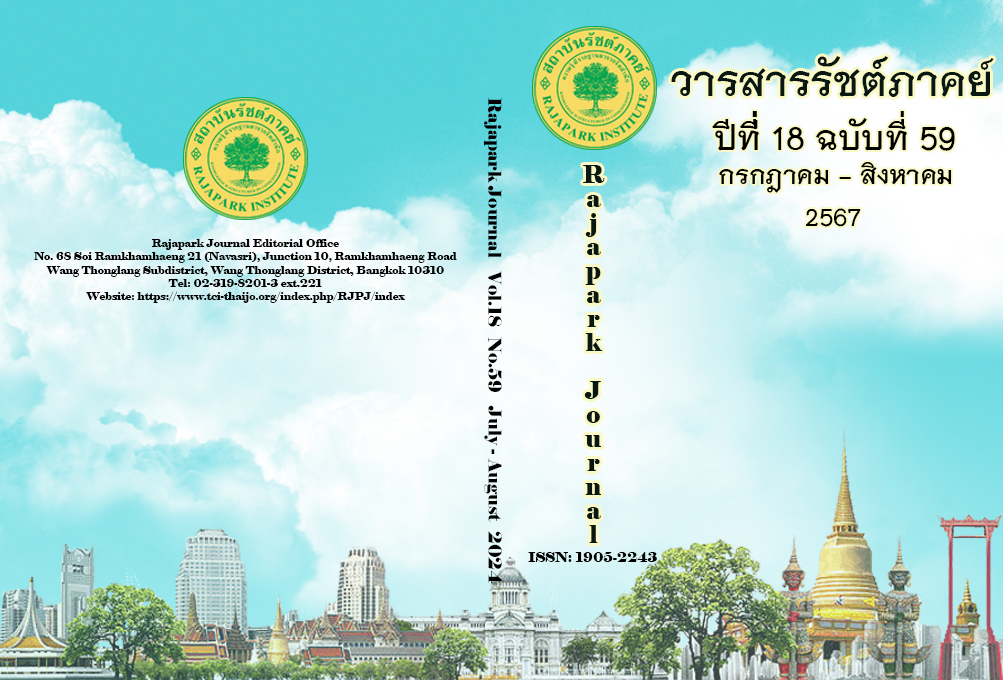Buddhist-Oriented Political Soft Power in Thai Society
Main Article Content
Abstract
The objectives of this research were 1) to study the concept of Buddhist political soft power in Thai society; 2) to synthesize the phenomena of political soft power in Tripitaka; and 3) to construct the model of Buddhist political soft power to be applied in Thai society. This research is qualitative, using documentary research on the Tripitaka, Attakata, textbooks, Pavikornviset Bibles, and research reports and theses. The research tools were structured in-depth interviews with eight key informants and group discussions with six experts, and the content was synthesized using data source triangulation to report the results of the research in a narrative presentation. Research results revealed that 1. the concept of political soft power in Thai society consisted of the following indicators: 1) political culture; 2) political values; and 3) political policy. 2. The synthesis of the phenomenon of political soft power in the Tripitaka revealed that King Bimbisara, King Asoka the Great, the Vajjiputra, the Makhamanava, the Kalamas, and the Chakkawatti Sutta used political soft power in three aspects: political culture, political values, and political policy, which are consistent with the 4 Dhamma principles, namely 1) Aparihaniyadhamma 7, 2) the ten principles of a righteous king, 3) Chakkawattivatthamma 5, and 4) Sanghavatthu 4. 3. The forms of Buddhist political soft power include “Dhammika State Power,” namely: 1) precepts, which means do not harm each other; 2) concentration, which means training the mind to be stable; and 3) wisdom, which means knowing the reasons and always developing oneself to be applied in Thai society to create innovation, which is a new body of knowledge.
Article Details

This work is licensed under a Creative Commons Attribution-NonCommercial-NoDerivatives 4.0 International License.
Views and opinions appearing in the Journal it is the responsibility of the author of the article, and does not constitute the view and responsibility of the editorial team.
References
Baker, K., & Phongpaichit, P. (2014). A history of Thailand. Matichon.
Bamrungsuk, S. (2014). Soft power. In Security Studies Project Journal, Vol. 136-137.
Charoenvattananukul, P. (2018). Rethinking soft power: Problems and misunderstandings in applying the concept in Thailand. Political Science Review, 4(1-2), 243-281.
Chimmakun, A., & Kritsuchina, P. (2018). The development of Thailand 4.0 with the Threefold Training in Buddhism. Journal of Philosophical Vision, 23(2), 57-68.
Jaiyakeaw, A., & Praneet, Y. (2022). Political culture under the development of Thai Democracy. Journal of Roi Kaensarn Academi, 7(7), 411-422. https://so02.tci-thaijo.org/index.php/JRKSA/article/view/255303
Kantalak. (2009). Soft power based on the concept of Joseph Nye. Naval Strategic Studies Journal, 84, 34-38. https://www.navedu.navy.mi.th/stg/tnssc/pdf/84-sp.pdf
Lavankura, P. (2021). Thai political thoughts in development policy. Journal of Social Sciences 51(2), 99-122. DOI:10.61462/cujss.v51i2.682
Laothamatas, A. (2016). On world democracy and Thai democracy. Klang Panya Institute National Strategics Rangsit University.
Nedtranon, I. (2020). Thai National Soft Power Within The 21st Century[Doctor of Philosophy in Public Administration Rangsit University].
Nye Jr., J.S. (2004). Soft power the means to success in world politics. Public Affairs.
Phuakkhong, C. (2023). Thai and eastern political thought. Samdee All.
Premwichai, P. (2023). Three studies for human resource development. Journal of Interdisciplinary Innovation Review, 6(1), 34-41. https://so04.tci-thaijo.org /index.php/jidir/article/view/259191
Phramaha Thanin Klinhom, T. (2020). Politics of Thai Government and Buddhism. Journal of Buddhist Philosophy Evolved, 4(2), 92-105. http://ojs.mbu.ac.th/index.php/jbpe/article/view/997
Yukaruç, U. (2017). A Critical Approach to Soft Power. Journal of Bitlis Eren University Institute of Social Sciences, 6(2), 491-502. https://www.researchgate.net/publication/332843308_A_Critical_Approach_to_Soft_Power
Yussayotha, A. (2007). Advice on and Solution of Social and Political Problems Given by the Buddha. Chulongkorn University Centre for Buddhist Studies.


